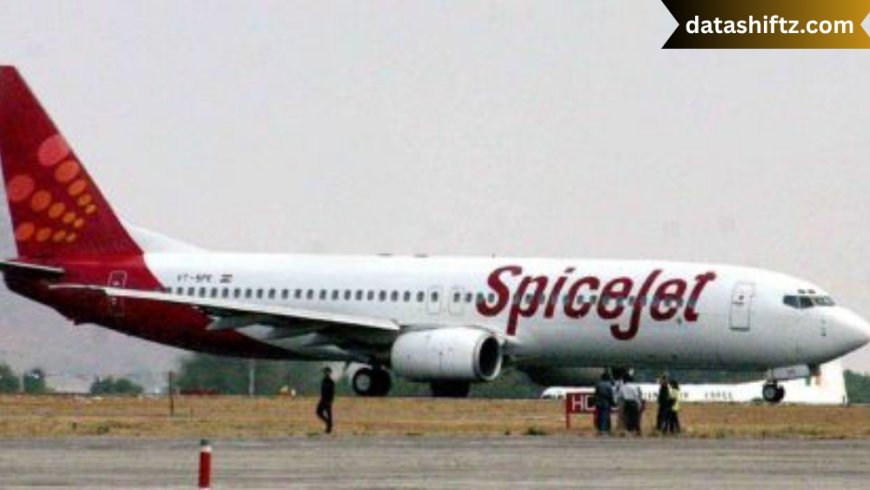Unruly Passengers & Cockpit Disruption on SpiceJet: A Deep Dive into Flight SG 9282 Incident

Introduction
On July 14, 2025, SpiceJet Flight SG 9282 from Delhi to Mumbai encountered a serious security incident: two unruly passengers attempted to storm the cockpit while the aircraft was taxiing, forcing the plane back to the gate and delaying takeoff by nearly seven hours. Thankfully, no one was injured, but the event has sparked national debate over in-flight safety, passenger behavior, and airline protocols. This article explores the incident in depth, its causes, impacts, and broader implications for aviation security in India and beyond.
The Incident — What Happened on Flight SG 9282
According to multiple reports, including those from The Economic Times and NDTV, the aircraft began taxiing around 12:30 PM when the disturbance occurred. Two passengers—reportedly agitated by the lack of air-conditioning—“allegedly forced their way forward” toward the cockpit door.
Despite repeated requests from cabin crew, fellow travelers, and even the captain, the duo refused to return to their seats . With safety compromised, the captain opted to abort taxiing, return to the terminal, and offload the disruptive passengers with assistance from the Central Industrial Security Force (CISF).
The flight was finally cleared and departed at 7:21 PM, landing in Mumbai around 9:05 PM—seven hours behind schedule.
Immediate Impacts and Operational Response
Safety Protocols & Crew Actions
-
Captain's decision to return to the terminal adhered to strict safety protocol aiming to prevent potential cockpit breach.
-
CISF involvement was swift; they safely removed the unruly passengers.
-
Cabin crew support was crucial, balancing de-escalation and command until authority arrived.
Passenger Experience & Delays
Other passengers described the scene as chaotic, with one flyer warning, “You cannot stop a plane like this; this is illegal,” while a passenger from the rear shouted, “AC chala de, hum baith jayenge” (“Turn on the AC, we’ll sit down”). The delay compounded traveler frustration, though no one reported injury.
Operational Disruption
| Event | Time |
|---|---|
| Scheduled Departure | 12:30 PM |
| Taxi Disruption Begins | ~12:35 PM |
| Return to Gate & Passenger Offload | ~1:00 PM |
| Delayed Departure | 7:21 PM |
| Arrival in Mumbai | ~9:05 PM |
| Total Delay | ~445 minutes (7h 25m) |
Underlying Causes: Temper & Tensions?
Air‑Conditioning Complaint
Initial signs suggest the incident began as a protest over uncomfortable cabin temperatures. However, the escalation to heading toward the cockpit shows deeper behavioral issues.
Broader Trend of Unruly Flyers
This is not an isolated event. Airlines have reported rising passenger misconduct—ranging from abuse of staff to attempts to access Emergency exits. In 2023, there were reports of passengers urinating aboard due to in-flight intoxication.
Security Gaps or Passenger Behavior?
Experts say cabin crew training and onboard law enforcement are critical. The DGCA has tightened regulations regarding unruly behavior, but incidents remain frequent.
Legal and Regulatory Considerations
DGCA Offense Classification
Cockpit intrusion attempts fall under Level 3 unruly behavior—considered threats to aircraft and passenger safety. Penalties may include up to two-year flying bans, fines, and criminal charges under the Aircraft Act and Indian Penal Code.
Airline’s Responsibilities & Reporting
SpiceJet is obligated to file an incident report with the DGCA. CISF may pursue legal proceedings. The DGCA then evaluates and may enforce penalties or bans.
International Regulations
Under ICAO standards, cockpit breaches constitute serious security violations. India, aligning with global aviation laws, will likely coordinate investigations and enforce bans under mutual agreements.
Aviation Industry Response & Public Reaction
Airline Industry Measures
SpiceJet’s swift return decision demonstrated strong cockpit security protocol. Still, airlines nationwide are reassessing:
-
Crew training enhancements
-
Physical cockpit barriers
-
Increased cabin announcements about behavior
-
Collaboration with airport security teams
Government & Regulator Actions
With rising incidents, the DGCA is urged to:
-
Introduce heftier fines
-
Extend no-fly periods
-
Raise public awareness of in-flight conduct
-
Tighten security checks post-incident
Passenger Feedback
While some passengers blamed SpiceJet’s AC failure, most praised the crew’s composure. There’s growing public support for stricter penalties against unruly behavior.
Broader Implications for Aviation Safety
Risk Assessment
Attempting unauthorized cockpit access is one of the most dangerous in-flight violations. It risks both aircraft safety and onboard harmony.
Safety vs. Convenience
Environmental factors (e.g. air-conditioning) are minor triggers that escalate due to a lack of personal restraint and awareness.
Industry Trends in Unruly Conduct
| Year | Unruly Incidents in India | Notable Cases |
|---|---|---|
| 2022 | Moderate | Air India and Indigo verbal attacks |
| 2023 | Increased reporting | Mid-flight intoxication, urination |
| 2025 | Continued rise | Cockpit intrusion attempts, delays |
Prevention Strategies for Airlines and Regulators
Key Measures to Reduce Unruly Incidents
-
Enhanced Crew De-escalation Training – Empower flight attendants to contain incidents early.
-
Stiffer Legal Penalties – DGCA to enforce long-term bans and fines for breaches.
-
Passenger Education Campaigns – Pre-flight videos or announcements emphasizing conduct rules.
-
Real-time Monitoring – Deployment of cabin surveillance (within privacy limits).
-
Upgraded Cockpit Defenses – Reinforced cockpit doors and secure access protocols.
-
Post-Incident Support – Counseling for traumatized crew and passengers.
Regulatory Collaboration
-
DGCA–CISF partnership for rapid intervention.
-
International data sharing via ICAO for tracking blacklisted individuals.
-
Public dashboards summarizing incident stats to boost awareness.
What This Means for Future Air Travel
Trust in Air Travel
Passengers expect safe travel. Incidents like this shake confidence—but swift, transparent responses can restore it.
Stricter Zero‑Tolerance Policies
This event may mark a shift toward mandatory passenger behavior compliance, more akin to zero-tolerance policies on ground transport.
Changing Crew Roles
Crew will need to balance hospitality with rigorous authority—a dual role of comfort and compliance.
Conclusion
The SpiceJet SG 9282 cockpit disruption incident reveals how quickly minor discomfort can spiral into serious safety violations. Thankfully, proactive crew action and established protocols prevented a disaster.
Moving forward, the aviation industry—especially in India—must toughen training, harden cockpit defenses, elevate legal frameworks, and educate the public. Level-headed, prepared responses ensure safe skies.
As air travel resumes momentum post‑pandemic, preserving security requires vigilance—and continued resolve against such disruptions.






























